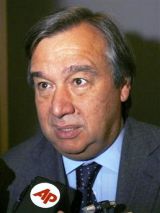Darfur force needed to avoid regional conflict – UN
Dec 21, 2006 (KHARTOUM) — The United Nations’ top refugee official said on Thursday it was essential to send an international peacekeeping force to Darfur to prevent the whole of central Africa plunging into conflict.
 “If the security situation deteriorates, we will have a very serious problem,” U.N. High Commissioner for Refugees Antonio Guterres told a news conference in neighbouring Chad.
“If the security situation deteriorates, we will have a very serious problem,” U.N. High Commissioner for Refugees Antonio Guterres told a news conference in neighbouring Chad.
“That is why a solution to the Darfur problem is necessary for the stability of the whole region,” the former Portuguese prime minister said.
Eastern Chad adjoins Sudan’s Darfur region, where a political and ethnic conflict has raged since 2003, killing tens of thousands of people and forcing 2.5 million others into sprawling camps and across the border into neighbouring states.
Guterres’s visit came as outgoing U.N. Secretary-General Kofi Annan launched a last-ditch effort for a “hybrid” peacekeeping force in Darfur.
In a letter delivered to Sudanese President Omar Hassan al-Bashir by his special envoy in Khartoum, Annan said he planned “to proceed expeditiously” in bolstering the African Union force now in Darfur with U.N. troops and resources.
“I therefore look forward to your early and positive response, which will ensure a common understanding among all stakeholders on the way forward in resolving the crisis in Darfur,” he wrote.
Annan’s personal envoy to Khartoum, Ahmedou Ould-Abdallah, met Bashir on Thursday.
Sudan rejects a U.N. Security Council resolution authorising 22,500 U.N. troops and police to take over from a struggling AU peacekeeping mission which has failed to stem Darfur’s violence.
Khartoum says the U.N. plan is an attempt at Western colonisation, but critics say it really fears those troops might arrest officials likely to be indicted by the International Criminal Court investigating alleged war crimes.
Sudan’s state news agency SUNA quoted Foreign Ministry official al-Sadig al-Magli as saying Khartoum welcomed U.N. support for the AU force. But he stopped short of saying Sudan had agreed to allow a joint U.N.-AU force in Darfur.
VIOLENCE INCREASES
Violence in Darfur has increased since a peace deal was signed with only one of three rebel negotiating factions in May. The rebels who rejected the agreement formed a new alliance and renewed hostilities with the government in June.
In December, attacks and clashes in Darfur forced 400 aid workers to be evacuated and paralysed humanitarian operations.
A U.N. bulletin on Thursday said the AU command had instructed that AU vehicles should not leave their bases in many locations for fear of banditry. One AU source confirmed this in specific areas where attacks were common.
On Thursday, the United Nations said an international aid agency convoy was ambushed near el-Geneina town in West Darfur this week. One aid worker was shot in the leg and a policeman escorting the convoy killed.
Sudanese rights group SUDO was banned from working in North Darfur, a SUDO official said on Thursday, after trying to implement a human rights workshop in five schools.
“They think we are using this project as a cover for intelligence and that we are working with the international community and United Nations,” Khalil Toukas, SUDO’s manager in North Darfur, told Reuters by telephone. “We received a letter … saying we had to stop work.”
In an attempt to ease what aid workers call one of the world’s worst humanitarian crises, Britain donated a further 40 million pounds ($76 million) to help Darfur.
“As we head towards the new year, it is of critical importance that the international community provides early and adequate finance to sustain the massive humanitarian response needed in Darfur,” Hilary Benn, Britain’s international development minister, said in a statement on Thursday.
(Reuters)
